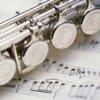 Attention-Deficit Rest Counting
Attention-Deficit Rest Counting
17:48 on Saturday, March 27, 2010

|
|
|
|
Re: Attention-Deficit Rest Counting
20:07 on Saturday, March 27, 2010

|
|
 |

Go-Home-and-Prac
tice
|
Posted by Go-Home-and-Practice
If I have a long rest, I label important measures based on what section comes in with what. Example: measure 123, the trumpets come in with the theme on beat three, or whatever applies. Then I start counting there.
Another idea is to ask the other flute players in your section to help you out. If they subtlety count with their fingers, you can confirm your counting by looking at theirs.
Sometimes it's just a matter of being confidant. While you're counting try not to start thinking, "wait...am I counting this right? What if...??"
Often for me, it just boils down to practicing counting along with a recording. That helps sometimes.
I also used to have similar problems with long rests. Almost everything can get better with practice and time.
Good luck!
|
|
 |
|
Re: Attention-Deficit Rest Counting
04:34 on Sunday, March 28, 2010

|
|
 |

Pyrioni
(437 points)
|
I don't count 5 two three four and 6 two three four. I only count the first beats 5...6...7...8
Normally over 15-20 rests, the scores will give you other instrument's notes so you know when to enter  <Added> <Added>Another trick of mine to count over 10 bars:
I hold the flute with my left hand, and then I count bars with my right hand 5 fingers, I count them in 5s to verify, to make sure I don't mis-count if you know what I mean... For example 18 bars, that must be 3 fingers used - 5,5,5,3
|
|
 |
|
Re: Attention-Deficit Rest Counting
21:58 on Sunday, March 28, 2010

|
|
 |

arabians207
(259 points)
|
I sometimes have the same problem not remembering if i do 1123 2234 etc knowing if I'm at 5 or 6 like you said. But I learned a trick lol. I usually count in 5's on my fingers like 1234 2234 3234 and with fingers like once you get to six that is one again. Seven is 2, eight is 3 etc. Then 11 is one again etc if that makes sense. I hardly ever get lost anymore 
Also when I know a song well enough I can usually tell where to come in without counting, but I always count as a back up. I also occasionally look at others in my section I know kinda mouth the numbers to make sure im not off.
And for your solo if you want the cue as a back up, ask for it! Most conductors are more than willing to give you a reassuring cue.
|
|
 |
|
Re: Attention-Deficit Rest Counting
23:51 on Sunday, March 28, 2010

|
|
|
|
Re: Attention-Deficit Rest Counting
20:36 on Tuesday, March 30, 2010

|
|
|
|
Re: Attention-Deficit Rest Counting
10:51 on Wednesday, March 31, 2010

|
|
|
|
Re: Attention-Deficit Rest Counting
13:20 on Wednesday, March 31, 2010

|
|
 |

Kanea
(11 points)
|
Actually, if I can manage without counting rests, I don't count them. Of course, when the band has a new piece, I have to count them, but I try to listen and remember what the other sections are doing. After the pieces have been played over and over again, I can remember when the flutes have to make their grand entrance  fairly well, so I don't have to count anymore. And yes, listening to recordings helps as well.
There's a reason why I don't like counting, especially if there are many rests: I tend to get lost, meaning that I have to rely on the other flutes to get it right. Once in a while this strategy can be used, but I don't like feeling helpless - besides, it is possible that the others get lost, too!
When I do count rests, I prefer counting them like this: one, one, one, one, two, two, two, two etc. I do this for long counts, and it seems to work moderately well. However, I prefer relying on my memory when possible.
|
|
 |
|
Re: Attention-Deficit Rest Counting
19:05 on Wednesday, March 31, 2010

|
|
 |

Tibbiecow
(480 points)
|
Yep, we sight-read our June concert program last night and the regular counting worked just fine. We're expected to get lost sight-reading in the complicated parts, the conductor yells out the measure number or rehearsal marking. (There were some truly impossible page turns, too.) With lots of scales practice, my sight reading has gotten better, and I was really pleased with how I did.
My troubles have tended to be in fairly complicated music, in the last couple of rehearsals or the concert. When we did De Meij's Lord of the Rings, I was on piccolo, which comes in here and there as a bird in the forest; I never seemed to be able to count it the same way twice, and I put the bird in a measure early in the concert. (I think only the director and I noticed that one, though!) But it is frustrating, and I want to make it work better. So thanks for all the replies 
|
|
 |
|
Re: Attention-Deficit Rest Counting
02:58 on Thursday, April 1, 2010

|
|
 |

Pyrioni
(437 points)
|
Yes, Kanea, if you had too much rehearsals, you don't even need to count, everybody just play by ears, lol.
In 1812 overtune, we had a lot of rehearsals, and there was one night, the horns were not here, our conductor had to sing out the horn part, but somehow he was one bar earlier, then the next bar almost all of us sang out the horn part together, lol, so you see, we can remember other instruments parts in our brain.
<Added>
"I put the bird in a measure early in the concert." - LOL, you are the bird, you're free to fly....
|
|
 |
|
Re: Attention-Deficit Rest Counting
09:04 on Thursday, April 1, 2010

|
|
|
|
Re: Attention-Deficit Rest Counting
18:19 on Thursday, April 1, 2010

|
|
|
|
|
|
|